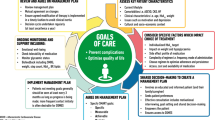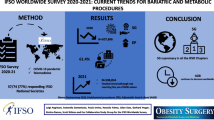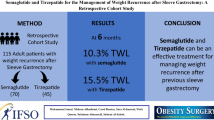Abstract
Purpose
Recently, more than 10 models have been developed to predict remission of type 2 diabetes mellitus (T2DM) after metabolic surgery. The ABCD score was compared to the individualized metabolic surgery (IMS) score in terms of prediction of T2DM remission, but which of the two scoring systems is better remains controversial.
Methods
Patient data from 463 obese East Asian patients who underwent laparoscopic Roux-en-Y gastric bypass (RYGB), sleeve gastrectomy (SG), or SG with duodenojejunal bypass (SG-DJB) as a primary operation and were followed for at least 3 years were retrospectively collected from 24 institutions. The correlation between the ABCD and IMS scoring systems and the discrimination power of the models was evaluated. The cut-off point for the IMS stage of T2DM severity was also revised to adjust the scoring system to obese East Asian patients.
Results
The two scoring systems were significantly well correlated. The IMS scoring system showed significant differences in T2DM remission rates between the procedures in the moderate stage, but the ABCD score showed no significant differences in each category. The discrimination power of the IMS score was comparable to that of the ABCD score at both 3 and 5 years. The revised IMS scoring system showed that SG-DJB had significantly higher T2DM remission rates in the moderate stage at 5 years than RYGB or SG.
Conclusion
IMS score may be comparable to ABCD score to predict T2DM remission in obese East Asian patients. The revised IMS scoring system may also select candidates for SG or SG-DJB.

Similar content being viewed by others
References
Shen SC, Wang W, Tam KW, et al. Validating risk prediction models of diabetes remission after sleeve gastrectomy. Obes Surg. 2019;29:221–9. https://doi.org/10.1007/s11695-018-3510-7.
Lee WJ, Hur K, Wong S, et al. Metabolic surgery ABCD score: predicting the success of surgical treatment diabetes. Obes Surg. 2013;23:1020.
Lee WJ, Almulaifi A, Tsou JJ, et al. Laparoscopic sleeve gastrectomy for type 2 diabetes mellitus: predicting the success by ABCD score. Surg Obes Relat Dis. 2015;11:991–6. https://doi.org/10.1016/j.soard.2014.12.027.
Lee WJ, Chong K, Aung L, et al. Metabolic surgery for diabetes treatment: sleeve gastrectomy or gastric bypass? World J Surg. 2017;41:216–23. https://doi.org/10.1007/s00268-016-3690-z.
Aminian A, Brethauer SA, Andalib A, et al. Individualized metabolic surgery score: procedure selection based on diabetes surgery. Ann Surg. 2017;266:650–7. https://doi.org/10.1097/SLA.0000000000002407.
Chen JC, Hsu NY, Lee WJ, et al. Prediction of type 2 diabetes remission after metabolic surgery: a comparison of the individualized metabolic surgery score and the ABCD score. Surg Obes Relat Dis. 2018;14:640–5. https://doi.org/10.1016/j.soard.2018.01.027.
Still CD, Wood GC, Benotti P, et al. Preoperative prediction of type 2 diabetes remission after Roux-en-Y gastric bypass surgery: a retrospective cohort study. Lancet Diabetes Endocrinol. 2014;2:38–45. https://doi.org/10.1016/S2213-8587(13)70070-6.
Bhandai M, Fobi MAL, Buchwald JN, et al. Standardization of bariatric metabolic procedures: World Consensus Meeting Statement. Obes Surg. 2019;29(Suppl 4):309–45. https://doi.org/10.1007/s11695-019-04032-x.
Seki Y, Kasama K, Haruta H, et al. Five-year-results of laparoscopic sleeve gastrectomy with duodenojejunal bypass for weight loss and type 2 diabetes mellitus. Obes Surg. 2017;27:795–801. https://doi.org/10.1007/s11695-016-2372-0.
Lee WJ, Lee KT, Kasama K, et al. Laparoscopic single-anastomosis duodenal-jejunal bypass with sleeve gastrectomy (SADJB-SG); short-term result and comparison with gastric bypass. Obes Surg. 2014;24:109–13. https://doi.org/10.1007/s11695-013-1067-z.
Brethauer SA, Kim J, el Chaar M, et al. Standard outcomes reporting in metabolic and bariatric surgery. Surg Obes Relat Dis. 2015;11:489–506. https://doi.org/10.1016/j.soard.2015.02.003.
Naitoh T, Kasama M, Seki Y, et al. Efficacy of sleeve gastrectomywith duodenal-jejunal bypass for the treatment of obese severe diabetes patients in Japan: a retrospective multicenter study. Obes Surg. 2018;28:497–505. https://doi.org/10.1007/s11695-017-2874-4.
Ohta M, Seki Y, Park S, et al. Comparison between ABCD and IMS scores in the prediction of long-term T2DM remission after metabolic surgery in East Asian obese patients. J Metab Bariatr Surg. 2019;8:34–6. https://doi.org/10.1007/s11695-017-2874-4.
Seki Y, Kasama K, Yasuda, et al. The effects of laparoscopic sleeve gastrectomy with duodenojejunal bypass on Japanese patients with BMI<35 kg/m2 on type 2 diabetes mellitus and the prediction of successful glycemic control. Obes Surg. 2018;28:2429–38. https://doi.org/10.1007/s11695-018-3179-y.
Lee WJ, Chong K, Lin YH, et al. Laparoscopic sleeve gastrectomy versus single anastomosis (mini-) gastric bypass for treatment of type 2 diabetes mellitus: 5-year results of a randomized trial and study of incretin effect. Obes Surg. 2014;24:1552–62. https://doi.org/10.1007/s11695-014-1344-5.
Schauer PR, Bhatt DL, Kirwan JP, et al. Bariatric surgery versus intensive medical therapy for diabetes - 5-years outcomes. N Engl J Med. 2017;376:641–51. https://doi.org/10.1056/NEJMoa1600869.
Zachariah PJ, Chen CY, Lee WJ, et al. Compared to sleeve gastrectomy, duodenal-jejunal bypass with sleeve gastrectomy gives better glycemic control in T2DM patients, with lower β-cell response and similar appetite sensations: mixed-meal study. Obes Surg. 2016;26:2862–72.
Huang CK, Tai CM, Chang PC, et al. Loop duodenojejunal bypass with sleeve gastrectomy: comparative study with Roux-en-Y gastric bypass in type 2 diabetic patients with a BMI <35 kg/m2, first year results. Obes Surg. 2016;26:2291–301. https://doi.org/10.1007/s11695-016-2118-z.
Pessoa BM, Browning MG, Mazzini GS, et al. Factors mediating type 2 diabetes remission and relapse after gastric bypass surgery. J Am Coll Surg. 2020;230:7–16. https://doi.org/10.1016/j.jamcollsurg.2019.09.012.
Saiki A, Yamaguchi T, Tanaka S, et al. Background characteristics and postoperative outcomes of insufficient weight loss after laparoscopic sleeve gastrectomy in Japanese patients. Ann Gastroenterol Surg. 2019;3:638–47. https://doi.org/10.1002/ags3.12285.
Dixon JB, Lambert GW, Chuang LM, et al. Predicting the glycemic response to gastric bypass surgery in patients with type 2 diabetes. Diabetes Care. 2013;36:20–6. https://doi.org/10.2337/dc12-0779.
Dixon JB, Hur KY, Lee WJ, et al. Gastric bypass in type 2 diabetes with BMI <30: weight and weight loss have major influence on outcome. Diabet Med. 2013;30:e127–34. https://doi.org/10.1111/dme.12107.
Park JY, Kim YJ. Prediction of diabetes remission in morbidly obese patients after Roux-en-Y gastric bypass. Obes Surg. 2016;26:749–56. https://doi.org/10.1007/s11695-015-1823-3.
Acknowledgments
We thank Ms. Yuka Honda and Ayaka Noguchi for their assistance in the management of this study.
Author information
Authors and Affiliations
Corresponding author
Ethics declarations
Conflict of Interest
The authors declare that they have no conflict of interest.
Ethical Approval
All procedures performed in studies involving human participants were in accordance with the ethical standards of the institutional and/or national research committee and with the 1964 Helsinki declaration and its later amendments or comparable ethical standards. For this type of study, formal consent is not required.
Standard of Informed Consent
The study has been approved by the Ethics Committee of Oita University Faculty of Medicine, and the informed consent was obtained by the opt-out method, because this study was retrospective and anonymized, and included the data of many former patients.
Additional information
Publisher’s Note
Springer Nature remains neutral with regard to jurisdictional claims in published maps and institutional affiliations.
Rights and permissions
About this article
Cite this article
Ohta, M., Seki, Y., Ohyama, T. et al. Prediction of Long-Term Diabetes Remission After Metabolic Surgery in Obese East Asian Patients: a Comparison Between ABCD and IMS Scores. OBES SURG 31, 1485–1495 (2021). https://doi.org/10.1007/s11695-020-05151-6
Received:
Revised:
Accepted:
Published:
Issue Date:
DOI: https://doi.org/10.1007/s11695-020-05151-6




